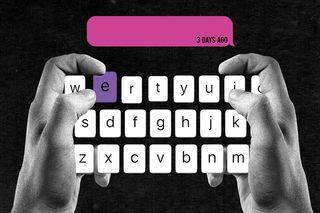
Slow Texters Are Making a Strong Case for Not Replying To Everything Instantly
Slow response times are a rejection of the lockdown expectation that everyone is constantly available.

Buzz! You have an out-of-hour work mail. Ah, a Slack notification stealthily makes its way to the notification tab. Buzz! Someone on WhatsApp demands your attention. A ‘???’ now becomes the fifth unopened message from the same person. Buzz! An Instagram suitor awaits your reply. All of them get some form of ‘sorry I missed your message.’
The phone has been a dear friend, a body part extension, a lifeline during the pandemic. But like everything touched by the health crisis, it now feels laden with stress. Perhaps it’s time to pay heed to what a rogue, tiny section of society has been advocating for: to eschew instant messaging for a calmer cycle of correspondence. In the interest of granting it legitimacy, people have called this ‘slow texting,’ and it means exactly what it promises:a culture in which late replies are the norm, people are given the leeway to respond depending on their emotional and mental bandwidth, and everyone takes the time to simmer over dispatches before sending forth their (hot) take.
It’s a (slow) fight back against a society that literally prefers to be left to its own devices. About 90% of phone owners “frequently” carry their phones with them, a Pew survey found, with 76% of people saying they turn their phone off “rarely” or “never.”
Part of this is due to a change in a work culture that has taken ‘always on’ to a new level. According to a U.S. survey conducted by an international think tank, four out of five workers find it hard to “shut off” in the evenings. A joint study by Harvard University and NYU analyzed more than 3 million responses since the coronavirus pandemic began and found that, on average, the workday is nearly an hour longer because of mass remote work. And when people are working, they are expected to be available.
But the other part of our fast-texting culture is due to our wanting to stay in the know, to be entertained, or just to be connected, which also make shutting off difficult. Over the past year, many people have reported extremes in their social media use: periods of constant usage that ultimately led them to feel overwhelmed or anxious. Yamalis Díaz, Ph.D., a clinical assistant professor in the department of child and adolescent psychiatry at New York University (NYU)’s Grossman School of Medicine, tells Healthline that, “It doesn’t bother shutting off if we are constantly receiving notifications or reading and watching the news, with pings, and dings, and emails.”
What it leads to isn’t favorable. “…this anxiety [over responding] adds to one’s daily stress, is a distraction, and frequently leads people to spend unnecessary time attempting to resolve the tension that has now arisen,” Forrest Talley, Ph.D. tells Southern Living. The result is additional anxiety in an already-anxious time — which slow texting can help defuse.
Related on The Swaddle:
It’s Okay: to Be Bad at Keeping in Touch
Slow texting can also lead to more meaningful conversations. Texting during the pandemic has played by a certain script, circular in its style: salutation, check-up about career/family/personal updates, Covid bashing, and repeat after a few days. Arguably, this semblance of contact has been a source of strength and sanity for many people, but if this were to happen instantaneously and every day, the whole exchange would die down in meaning and substance.
Additionally, while “digital messages mimic the speed of real conversations … often what people like best is the ability to put them off,” Julie Beck observes pithily in The Atlantic. She explains that the fast back-and-forth dialogue, in the absence of “the additional context of body language, facial expression, and intonation,” makes a conversation infinitely harder. The misunderstandings, delayed corrections, and inadequate explanations feed into an awkward mountain of anxiety.
But ultimately slow texting boils down to: just because people can respond at all times, doesn’t mean they want to or should. Critics may jump and make counter-arguments of their own here, all of which play to the tune of calling people uncouth, making it a men/women/boy/girl trait, or drawing other sinister explanations. But slow texters’ heretical take is this: taking time to respond is merely people valuing their time and showing ownership of it; to demand they do otherwise is in line with social media values of instant gratification. It’s as if once you’re plugged into the internet, personal time becomes a public commodity, and anyone can exercise control over it.
There is an element of toxicity in asserting, even demanding, that someone gets back to you; it infuses people with the guilt of letting others down or defying the obligation to respond, fuelling up anxiety and stress. There are trite apologies, facile punchlines: sorry I missed your message, sorry for the delayed response, et al. The need for those shouldn’t arise in the first place. Perhaps, people could give a headstart or a timeline by when they expect a response. By slow texting, we negate the idea that we ‘owe’ our time and attention, and we reclaim what’s ours.
If anything, immediate connectivity enables people to deal with a conversation on their own terms: responding at a minute’s notice is as much an option as putting it off for days and weeks, or never getting around to it at all. There’s a sense of liberation in this madness. Setting personal boundaries, and accepting them, is maybe a good start to safeguarding our social well-being.
The lockdown has sharpened the case for taking a step back from the hyper-connected world and swerving to one that values emotional well-being and personal space. In a world where digital lives masquerade as real lives (or perhaps are one and the same), having people steal moments from your life isn’t the best living arrangement. Embracing the seemingly uncouth ways of late replies and slow texting might help preserve time and energy.
Alas, there is peace in knowing that if all else fails, you can always blame the internet connection.
Saumya Kalia is an Associate Editor at The Swaddle. Her journalism and writing explore issues of social justice, digital sub-cultures, media ecosystem, literature, and memory as they cut across socio-cultural periods. You can reach her at @Saumya_Kalia.
Related


Woe Is Me! “My Life Is Great, But I Always Compare Myself To Other Women!”
